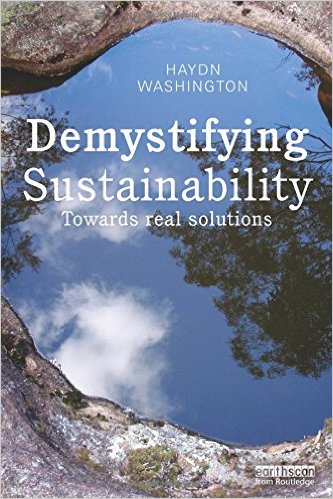
SATURDAY, FEB 18, 2017: NOTE TO FILE

Demystifying Sustainability: Towards real solutions
by Haydn Washington
Eric Lee, A-SOCIATED PRESS
TOPICS: MAIN POINTS, FROM THE WIRES, OUT OF THE MIST
TUCSON (A-P) — Thanks for reading/looking over the synopsis and probably reading the Forward and Introduction too. Here's the last page of the book:
Our first hope must be [Plan A] that we prevent collapse by following a new set of philosophical, ethical and cultural norms that bring about a 'life-sustaining' civilisation. The solutions are there. But if we are realists, we should also prepare a 'secondary hope' [Plan B], that failing to prevent the 'Great Unravelling', we preserve enough knowledge and wisdom [information] so that as the dust settles, with a stable lower population and consumption [secondary to chaotic collapse], our descendants don't reinvent our mistakes [repeat the pattern]. The times we live in thus seem orchestrated to bring forth from us the greatest moral strength, courage and creativity. We each must seek to rise to this task. This is true moral integrity, the moral compass by which we can steer. This is honour to the world that bore us. When things are this unstable, a person's determination, how they invest their energy, heart and mind ['protest'/inform], can have a much greater effect on the larger picture than we are accustomed to think. We desperately need to remember anthropologist Margaret Meade's comment (used with permission): 'Never doubt that a small group of thoughtful, committed citizens can change the world. Indeed, it is the only thing that ever has' [but I think therefore I doubt].
If enough of us undertake the 'Great Work', we will succeed [as 'agents of Earth]. However, no matter the number of us that take up the task, whether it be millions or billions [or dozens], we will make things better than they would have been if we had stood by and done nothing. The 'Great Work' lies before us. What task could be more inspiring or challenging?
To conclude, we still live in an amazingly beautiful world. It is truly a privilege to be here to witness it. I write this final section on my bit of land on the edge of the half a million ha Wollemi National Park in NSW, Australia. I write from a stone house I built myself from local broken rock and recycled timber. My computer and everything else is powered by the Sun. Outside, a red-neck wallaby grazes in the shade under gum trees. An hour ago, a 1.5 m long goanna (lizard) walked trustingly right past me (and my dog!) as I sat reading in my doorway. Nearby stretches the largest wilderness in the state of New South Wales, an area I fought to make a national park in the 1970s, and to which I will always feel the responsibility of being a custodian. What area could be more sustainable, more in harmony? This provides my personal hope. We can demystify sustainability and act on real solutions. We can live in harmony with Nature into the future, we can solve the environmental crisis. And we should.
We should feel wonder at (and respect) the nature of which we are a part. We should care about equity and equality, about human and environmental ethics, about justice at all levels, human justice and eco-justice. We should care about organising an economy that works within the Earth's limits [an eco-nomy], and that is equitable [0.8 to 1.2] to all. To be sustainable, we should have a loving engagement and commitment to the world that nurtured us, and still supports us. We should heal the broken things in our culture. This is what sustainability should be. It makes good sense on many levels, it is pragmatic, scientific, and ethical. Sustainability requires we encourage the 'best in humanity' [mindful science], that we rise up past our current broken modernist culture, that we become 'fully human' through caring and sharing. Sustainability is within our grasp, we can live in loving harmony into the future with this wondrous world to which we are privileged to belong. Now, to be meaningfully sustainable it is time to demystify sustainability, cut through the waffle and tokenism, and accept both reality and responsibility. It is time to listen to the Earth, foster our compassion, grasp our moral integrity — and act.
Now read the book.

